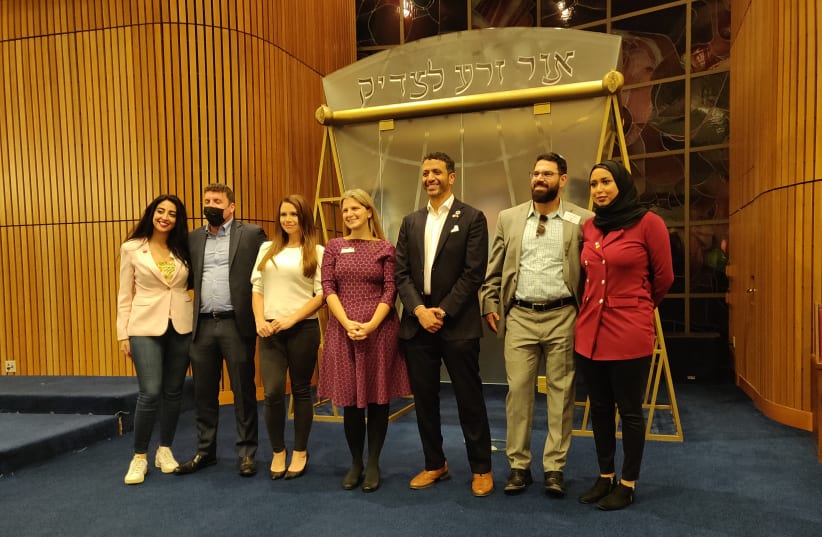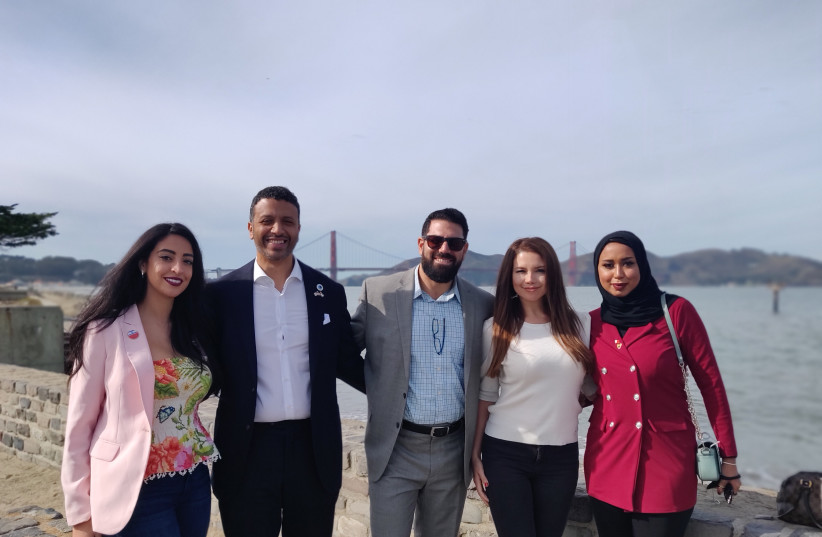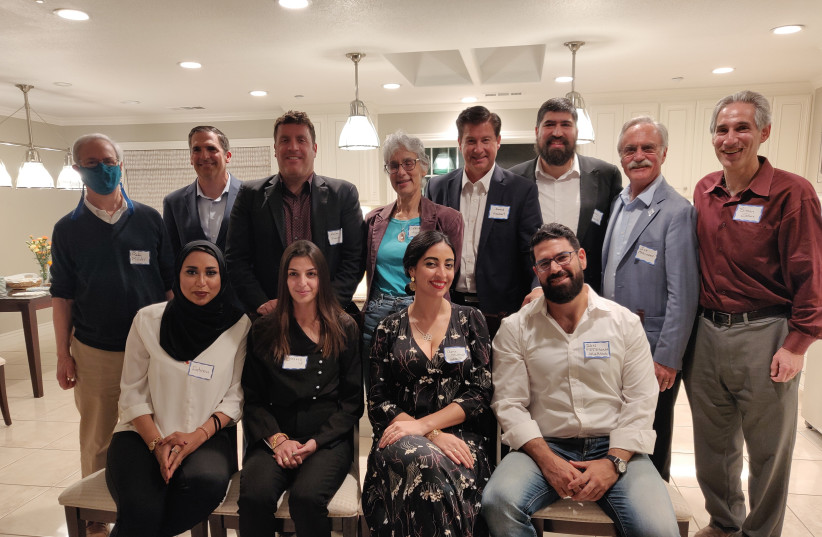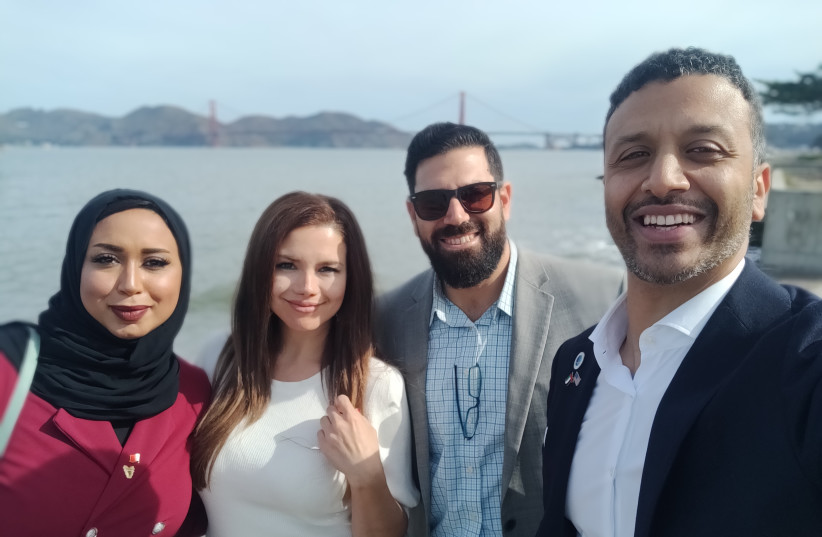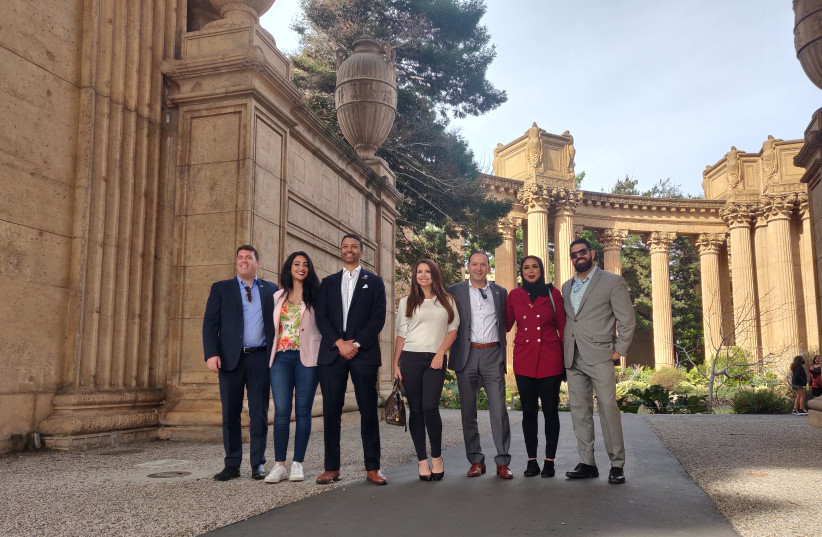To many Israelis and Gulf-state Arabs, the Abraham Accords are a historic fulcrum for peace in the region. But to some Americans, the accords are viewed with suspicion, an imposition by former US president Donald Trump on the Middle East.
It’s to challenge this misconception that the NGO Sharaka sent a delegation of diverse Middle Eastern voices to tour the United States from November 7-14.
Sharaka is an organization that was created to be a civil society “extension of the Abraham Accords, which were mediated by the US,” said Dr. Majid Al Sarrah, founder and UAE CEO of Sharaka. “We sent this delegation to show Americans the fruits of these efforts.”
The diversity of the delegation was itself a testament to the success of the accords. The delegation included Emirati Fulbright Scholar Omar Al Busaidy, Druze-Israeli digital public diplomat Lorena Kahteeb, Syrian-born American journalist Hayvi Bouzo, Bahraini peace activist Fatema Al Harbi, Amazigh-Moroccan artist Chama Mechtaly and Sharaka’s Global Affairs Director Dan Feferman, an Israeli Jew.
For seven days, the group of activists traveled through Democratic strongholds on the West Coast.
“There were different synagogues that we spoke at,” said Bouzo. “And there was the Democratic Party Jewish club. There were different people’s homes... They hosted us and had their friends come.”
Feferman said too many are either unaware or skeptical of these new peace agreements due to domestic American partisan politics. “We need their support to ensure the US continues to promote the accords and help expand them to new countries.”
Getting past American political divisions is no small feat.
Some US leaders and commentators have derided the accords as a false achievement by the Trump administration, just a publicizing of pre-existing relationships. “‘This is a business deal,’ J Street President Jeremy Ben-Ami told The New York Times last month. “There are aligned interests between Israel and these countries... for two decades.”
According to Haaretz, the far-left IfNotNow group argued that the accords were used by Trump to sideline “Palestinians who are treated as political pawns and excluded from decision-making about their own future.”
Columnist Peter Beinart argued in a Jewish Currents article that the accords were “Israel’s repressive diplomacy” that contributed to regional authoritarianism.
These same challenges were directed at the delegation.
“I think that it’s good that they were asked because the people need to know about the answers,” said Bouzo. “We heard a lot of people say, ‘it’s a business deal.’ So what’s wrong with having a business aspect to it? I think that would be great.”
Bouzo’s reasoning, and one shared by other delegates, is that there are many levels to the new interactions between the Abraham Accords countries, and while some may be at political and business levels, they’re needed to sow fertile soil for grassroots efforts.
“You need leadership to take the first steps to allow social initiatives and changes to happen,” said Mechtaly. “You also need the bottom-up approach to deepen the relationship.”
Bouzo said, “Obviously there are many problematic governments and regimes in the region, but at least those countries that made those deals are doing a good thing. Let’s see how we can make this expand on the people’s level.”
While the Abraham Accords were signed and facilitated by the Trump administration, Mechtaly notes, people on the ground were trying to work on this for decades. People like Busaidy, who had been waiting for this moment, expressed “joy that, finally, we have these diplomatic relations.”
That Middle Easterners were waiting for this moment isn’t captured in the narrative the delegation’s audiences had previously been exposed to.
“Many of these people are super-surprised. They’re completely not aware,” said Busaidy. The media they consume has only covered negative things since the signing, and “nothing positive from the region reaches these audiences.”
Bouzo said there’s a lot of division in the US between the Left and Right, and according to her, the accords should be a non-partisan issue. “It’s actually something that’s going to benefit the people in the Middle East.”
According to Mechtaly, their efforts weren’t in vain. After their talks, people expressed to her their renewed hope. Busaidy shared that the group had met Rep. Ro Khanna in San Francisco. “He was willing to meet us, and he was extremely excited and even talked about how he’s willing to support this even further.”
“It’s basically the future,” said Bouzo. “And a lot of people are just very happy to see it.”
The impact of the accords is just the tip of the iceberg, said Mechtaly. The future could include Palestinians as well. Busaidy hoped to one day see Palestinians with him on the delegation.
“The Abraham Accords doesn’t mean that conflict goes away, but does present a new approach and does chip away at the extreme factors impacting the ability to proceed,” said Mechtaly.
Palestinian and Israeli relations are not mutually exclusive, she argued.
Amit Deri, founder and Israel CEO of Sharaka, said, “The way forward is dialogue, cooperation and partnership. That is why we called our organization Sharaka – which means ‘partnership’ in Arabic.”
Future delegations like this one will show if the representatives of the new Middle East are able to help Americans move forward beyond their partisan perspective, and into the partnership for peace.
